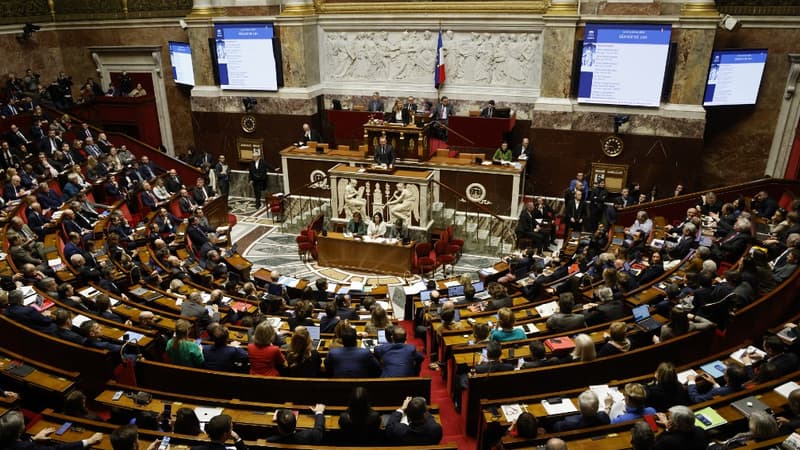The pension reform enters one of its last laps. Depending on the result of the motions of censure debated this Monday from 4:00 p.m., it could be adopted. However, the oppositions have other means to prevent its promulgation, such as recourse to the Constitutional Council or the organization of a shared initiative referendum. BFMTV.com discusses these different possibilities.
motions of no confidence
The deputies will examine two motions of censure. One comes from the National Group (RN), the other, wanted to be a transpartisan, from the group Libertés, Indépendants, Outre-Mer and Territories (Liot) and the New Ecological and Social Popular Union (Nupes).
In the present case, if the provision becomes effective, it would lead not only to the overthrow of the government, but also to the rejection of the pension reform. However, the executive would maintain the possibility of submitting the text to a new reading in both chambers of Parliament, as required by the procedure for a text drawn up in a mixed commission (CMP).
However, this scenario is unlikely. Everything will be decided with a few votes of the deputies of Les Républicains. To be approved, the motion must gather an absolute majority of the votes, that is, 287 at present, and not 289, due to partial legislative elections. A good part of that total will be reached thanks to the votes of the left, the extreme right and the Liot group. However, about thirty votes from the right will be missing.
However, the elected representatives of this political family willing to free themselves from the instructions of their management can be counted on the fingers of one hand. There will be ten, even fifteen, indicated the different “slingers” deputies present this Monday morning. Therefore, the motion of censure must, unless it is surprised, be rejected. However, the law will not necessarily be enacted.
The Constitutional Council
The oppositions have several levers. First option: present an appeal before the Constitutional Council, which has the power to censor the text in part or in its entirety if it considers it unconstitutional. To seize it, it is necessary to gather at least 60 parliamentarians. The promulgation of the law is then suspended and the authority has a month to study the remission. However, the government can request “if there is urgency”, to reduce this period to eight days, under article 61.3 of the Constitution.
The possibility of an appeal before the Constitutional Council was raised by the rebels Mathilde Panot, Marine Le Pen but also by the deputy the centrist Charles de Courson, interviewed on BFMTV. In the viewer of the latter: the legislative vehicle used by the executive to reform it, that is, a social security financing reform project (PLFRSS). This type of text allows the use of article 47.1 of the Constitution, which limits debates to 50 days in the Cortes Generales.
On BFMTV-RMC, Charles de Courson denounced “a total abuse of the procedure”, pointing out that these bills generally follow “decisions to reduce social security contributions”. [qui] It impacted the social accounts.” However, this is not the case with the current reform, she stressed.
Deputy Liot, who is one of the main instigators of the inter-party motion of no confidence, also pointed to a whole series of budget clauses, that is, provisions that are not supposed to be part of this text. With, first of all, the employment index of the elderly, which is not a measure of income or expenditure.
“Everybody knows, including the government, that this part will fall before the Constitutional Council,” said Charles de Courson. Jean-Luc Mélenchon went further, saying that he was “sure” that the Wise Men “cancel[ont] the whole procedure.”
“Their role is to protect the institutions by enforcing them,” argued the leader of La France insoumise this Sunday in Le Grand Jury RTL-Le Figaro, LCI.
This body advocates “the clarity and sincerity of parliamentary debate.” However, the review of the reform may question this principle. The government, in addition to 47.1 and 49.3, has used other provisions to expedite debates such as 44.2 or 44.3. Not to mention article 38 of the Senate, used by the right-wing senatorial majority and which allows an amendment, an article or even a text to be voted on after two contradictory speeches. If these mechanisms are authorized, their accumulation could question the Elders.
The shared initiative referendum
If the motions of censure are rejected, the oppositions have one last weapon to reject the pension reform: the shared initiative referendum (RIP). This constitutional provision provides for the possibility of organizing a popular consultation on a bill “at the initiative of one fifth of the members of Parliament”, that is, at least 185 of the 925 parliamentarians and “supported by one tenth of the voters “, that is, 4.87 million people, whose signatures must be collected within 9 months.
The last attempt by RIP on the issue of the privatization of Aéroports de Paris failed in 2019, signed by only a million people. More generally, no initiative has been successful since the introduction of this provision in the Constitution in 2008. However, this did not prevent the left from presenting a RIP on Friday so that the legal retirement age does not exceed 62 years.
However, its implementation is not guaranteed. Indeed, a shared initiative referendum “cannot have as its object the repeal of a legislative provision promulgated less than a year ago,” provides for article 11 of the Constitution.
Therefore, if the PIR wants to have a chance to exist, it must be validated by the Constitutional Council, before the pension reform is. If this is the case, the collection of support is organized by the Ministry of the Interior for nine months, which provides potential signatories with a digital platform. During this period, the promulgation of the law is suspended. Or a break of almost a year for the government.
Source: BFM TV


